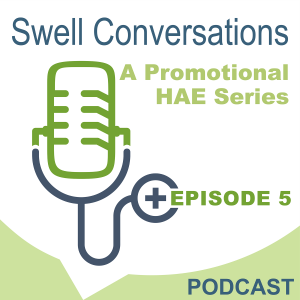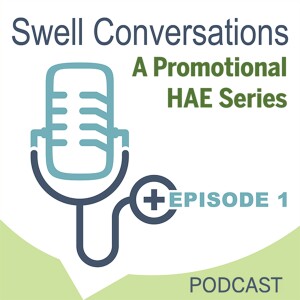Join us for an engaging discussion on potential contributors to patient anxiety related to hereditary angioedema (HAE). Our expert moderator, John Anderson, MD, clinical assistant professor at The University of Alabama at Birmingham and partner at AllerVie Health/AllerVie Clinical Research, welcomes Kimberly Poarch, PA-C, from Allergy & Asthma Specialists of Dallas. She will share emerging reports on factors impacting anxiety among patients with HAE and explore strategies to engage with patients in managing their disease. Additionally, clinical information about RUCONEST® (C1 esterase inhibitor [recombinant]), an approved on-demand HAE treatment option, will be highlighted.
WHAT IS RUCONEST?
RUCONEST® (C1 esterase inhibitor[recombinant]) is indicated for the treatment of acute attacks in adult and adolescent patients with hereditary angioedema (HAE). Effectiveness in clinical studies was not established in HAE patients with laryngeal attacks.
IMPORTANT SAFETY INFORMATION
RUCONEST is contraindicated in patients with a history of allergy to rabbits or rabbit-derived products and for patients with a history of life-threatening immediate hypersensitivity reactions, including anaphylaxis, to C1 esterase inhibitor (C1-INH) preparations.
Monitor patients for early signs of allergic or hypersensitivity reactions (including hives, generalized urticaria, tightness of the chest, wheezing, hypotension, and/or anaphylaxis). If symptoms occur, discontinue RUCONEST and administer appropriate treatment.
Serious arterial and venous thromboembolic (TE) events have been reported with plasma-derived C1-INH products. Risk factors may include the presence of an indwelling venous catheter/access device, prior history of thrombosis, underlying atherosclerosis, use of oral contraceptives or certain androgens, morbid obesity, and immobility. Monitor patients with known risk factors for TE events during and after RUCONEST administration.
Appropriately trained patients may self-administer RUCONEST upon recognition of an HAE attack. Advise patients to seek medical attention if progress of any attack makes them unable to properly prepare or administer a dose of RUCONEST. No more than 2 doses should be administered within a 24-hour period.
The serious adverse reaction reported in clinical trials was anaphylaxis. The most common adverse reactions (incidence ≥2%) were headache, nausea, and diarrhea.
Before prescribing RUCONEST, please read the full Prescribing Information including the Patient Product Information.
DISCLAIMER
This educational program is sponsored by Pharming Healthcare, Inc. The speakers have been compensated for the presentation of this information. The information contained within this podcast is for educational purposes only and is not intended to be medical advice. Patient experiences may be discussed in this episode. It is important to recognize that these experiences may not be representative, as every patient has a unique disease course. This activity is not intended for Continuing Medical Education credits.
EPISODE REFERENCE LIST
Maurer M, Magerl M, Betschel S, et al. The international WAO/EAACI guideline for the management of hereditary angioedema-The 2021 revision and update. Allergy. 2022;77(7):1961-1990. doi:10.1111/all.15214
Busse PJ, Christiansen SC, Riedl MA, et al. US HAEA Medical Advisory Board 2020 guidelines for the management of hereditary angioedema. J Allergy Clin Immunol Pract. 2021;9(1):132-150.e3. doi:10.1016/j.jaip.2020.08.046
Burnette A, Anderson J, Longhurst H, et al. Anxiety associated with parenteral on-demand treatment for hereditary angioedema (HAE). Poster presented at: AAAAI 2023 Annual Meeting; February 24-27, 2023; San Antonio, TX. Poster 433.
Bernstein JA, Tyson C, Relan A, et al. Modeling cost-effectiveness of on-demand treatment for hereditary angioedema attacks. J Manag Care Spec Pharm. 2020;26(2):203-210. doi:10.18553/jmcp.2019.19217
Radojicic C, Burnette A, van Kooten S, et al. Patient-reported anxiety impacts utilization of injectable ondemand treatment of hereditary angioedema attacks. Poster presented at: ACAAI Annual Scientific Meeting; October 24-28, 2024; Boston, MA. ePoster R086.
Geng B, van Kooten S, Heckmann M, et al. Understanding why hereditary angioedema patients often do not carry their on-demand treatment with them. Poster presented at: ACAAI Annual Scientific Meeting; November 9-13, 2023; Anaheim, CA.
Kaplan AP, Kusumam J. Pathogenesis of hereditary angioedema: the role of bradykinin-forming cascade. Immunol Allergy Clin North Am. 2017;37(3):513-525. doi:10.1016/j.iac.2017.04.001
Fields T, Ghebrehiwet B, Kaplan AP. Kinin formation in herediatry angioedema plasma: evidence against kinin derivation from C2 and in support of “spontaneous” formation of bradykinin. J Allergy Clin Immunol. 1983;72(1):54-60. doi:10.1016/0091-6749(83)90052-0
Ruconest. Prescribing information. Pharming Healthcare, Inc; 2020.
Riedl MA, Bernstein JA, Li H, et al; Study 1310 Investigators. Recombinant human C1-esterase inhibitor relieves symptoms of hereditary angioedema attacks: phase 3, randomized, placebo-controlled trial. Ann Allergy Asthma Immunol. 2014;112(2):163-169.e1. doi:10.1016/j.anai.2013.12.004
Zuraw B, Cicardi M, Levy RJ, et al. Recombinant human C1-inhibitor for the treatment of acute angioedema attacks in patients with hereditary angioedema. J Allergy Clin Immunol. 2010;126(4):821-827.e14. doi:10.1016/j.jaci.2010.07.021
RUC-US-2025-0034








